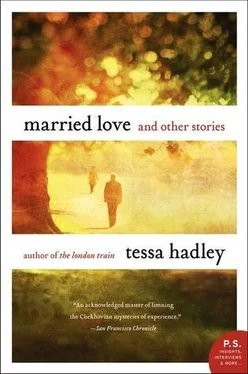— She ought to be abashed, Hattie said once. — We warned her. Instead, she seems to be angry with us.
Hattie had been longing for early retirement but she decided against it, fearing that the empty days might only fill up with grandchildren. She believed that in the mirror she could see the signs in her face — like threads drawn tight — of the strain of those extra years of teaching she had not wanted.
— Poor old Lottie, Duncan said.
— Lottie isn’t old. Poor Edgar.
At weekends, Duncan sometimes came home to find Edgar taking refuge at his kitchen table, drinking tea while the children made scones or collages with Hattie. Edgar didn’t do badly with them, considering, but it could take him three-quarters of an hour to get all three little girls stuffed into coats and mittens and boots and pushchairs, ready to go. Physically, he was rather meticulous and pedantic. If Lottie was with him, she would push his fine long fingers brusquely aside and take over the zipping and buttoning. — Here, let me do it, she’d snap. To his credit, Edgar didn’t seem to resent the intrusion of the babies into his life, or even to be wiped out by them, exactly: he gave himself over to their existence with a kind of bemused wonder. He drew himself down to their level, noticing everything they noticed, becoming involved in their childish chatter and speculation as Lottie didn’t have time to be. They adored him — they ran to cling to his legs whenever their mummy was cross. Edgar’s appearance was diminished, though, from what it had once been: his white hair had thinned and was cut shorter and lay down more tamely on his head; his clothes were the ordinary dull things anyone could buy in a supermarket. Hattie realised with surprise that it must have been Valerie who was behind the charcoal-grey linen shirts, the silk suits, the whole production of Edgar as exceptional and distinguished.
When Emily got pregnant with her first child, Lottie’s youngest was nine months old and Charis, her eldest, was five. Lottie dumped black bags of used baby things on Emily one evening without warning. — Chuck them out if you don’t want them, she said. — I’ve got no more use for them. I’ve had my tubes tied.
After he finished his degree, Noah went to London and found work intermittently as an assistant cameraman on small film projects. He dropped in at Lottie’s whenever he came home, and they fell easily into their old companionable closeness. She fed him whatever awful mush she had cooked for tea. He was useful for swinging his nieces about and throwing them in the air, all the rough play that Edgar had to be careful of. Often, Edgar wasn’t there; Noah assumed that he was working in his room at the university.
One summer evening, Noah was lying on his back on the floor in Lottie’s front room. Two floor-length sash windows opened from this room on to a wrought-iron balcony; Lottie had made Edgar fix bars across, to stop the girls from getting out there. A warm incense of balsam poplar mingled with petrol fumes breathed from the street. They had drunk the bottle of wine that Noah had brought with their teatime mush; while they were giving the girls a bath, Lottie had produced triumphantly from the back of a cupboard a sticky bottle half full of Bacardi that nobody liked, and now they were drinking that, mixed with blackcurrant cordial because that was all she had. — We’ll be horribly, pinkly, sick, Lottie predicted. The girls were asleep at last. While Noah lay supine, Lottie crawled round him on her hands and knees, grunting with the effort, putting away in primary-coloured plastic boxes the primary-coloured toys that were strewn like strange manna all around the carpet.
— I’m grey, she complained. — My life’s so grey.
— When does Edgar get back from work?
— Don’t be thick, Noah. Ed’s retired. The university couldn’t keep on employing him for ever. He’s seventy-two this year. Why d’you think I’ve been going on to you about how hard-up we are?
— Where is he, then?
— At Valerie’s, I expect.
Noah opened his eyes in surprise, angling his head up from the floor to get a look at her. — Oh!
— That’s where he usually is.
— Is that all right?
— Why shouldn’t he? When we’ve been paying half the mortgage for all these years — at least that’s finished at last, thank Christ. There’s a room there where he can work; it’s impossible here. And we don’t have space for a piano. He still likes to write at a piano, before he puts it on the computer.
— So they get on OK, him and Valerie?
— She brings him coffee and plates of sandwiches while he’s working. She unplugs the phone in the hall, in case it disturbs him. He plays things to her. I expect that sometimes while he’s in the throes of composition he forgets he doesn’t live there any more, in that quiet house.
— Mum said the house was old-fashioned.
— It is old-fashioned. Full of antiques, from Valerie’s mother, but Valerie wouldn’t know how to show them off. Valerie doesn’t have a showing-off bone in her body. She’s all complications. She’s a gifted cellist, apparently, but she can’t play in public.
— I suppose you’ve got to know her.
Lottie aimed bricks at a box. — Not in the face-to-face sense. Occasionally she and I do have to talk, about Harold’s allowance or whatever.
— He doesn’t still have an allowance?
— Not after we had the talk. On my wedding night, I tell you, it was like Bartók’s Bluebeard’s Castle . My metaphorical wedding night — I don’t actually mean that one night in particular. Behind the first door, the torture chamber; behind the second door, a lake of tears, and so on. Behind the last door were his other wives, alive and well. Well, the first one isn’t exactly alive, but I could tell you all about her.
— I’d forgotten there was a first one.
— Danish, actress, had problems with her abusive father, drank.
— He goes on about them?
— Not really. They’re just his life — they crop up, as you can imagine. There’s a lot of life behind him to crop up. Don’t forget, once Valerie was the one he ran away with.
— I’d never thought of it like that.
— Were the babies my revenge? Poor Ed, I’ve nearly killed him.
Lottie lay down on the floor, head to toe with Noah, holding her glass on the soft mound of her stomach, tilting the viscous red drink backward and forward as she breathed.
— Do you know what I did the other week? I was so angry about something — can’t remember what — that I drove up to the recycling depot with the babies in the back of the car to throw my violin into the skip for miscellaneous household waste.
Noah sat upright. — The one Mum and Dad bought for you? Didn’t that cost loads of money? Thousands?
— I didn’t actually do it. I looked down into the skip and got the violin out of the case to throw, and then I put it away again. Apart from anything else, I told myself, I could always sell it. And it’s possible I might want to start again, when this is over. But probably I won’t, ever.
— Is Edgar any good? Noah demanded drunkenly, suddenly aggressive. — I mean, is his music really, actually any good?
— Noah, how can you ask that? You’re not allowed to ask that.
Although Lottie protested, the question seemed intimately known to her, as if she had thrown herself too often against its closed door. — How can I judge? I can’t tell. I think he’s good. He’s writing something at the moment, for strings. It’ll get a premiere at the Festival. It’s something new, different. Actually, I think it might be lovely.
Just then they heard Edgar’s deliberate slow step on the stairs, his key in the door to the flat.
Читать дальше











